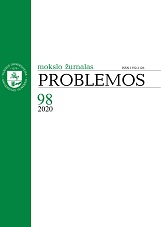The Relevance of Natorp’s Criticism of Husserl to the Hermeneutical Transformation of Heidegger’s Phenomenology
The Relevance of Natorp’s Criticism of Husserl to the Hermeneutical Transformation of Heidegger’s Phenomenology
Author(s): Stefano CazzanelliSubject(s): 19th Century Philosophy, Contemporary Philosophy, Phenomenology, Hermeneutics
Published by: Vilniaus Universiteto Leidykla
Keywords: Heidegger; Natorp; Husserl; Hermeneutics; Neo-Kantianism;
Summary/Abstract: This article will show how Natorp’s criticism of Husserlian phenomenology was one of the most important triggers of the hermeneutical transformation of Heideggerian phenomenology. Concepts like hermeneutical intuition, or tools like formal indication, are the means that Heidegger worked out in order to preserve the phenomenological access to pre-theoretical life as it gives itself. The first part of this article is devoted to presenting Natorp’s criticisms of Husserl’s phenomenology and Husserl’s attempts to answer them. The second part will illustrate how Heidegger, criticizing Natorp, retrieves the validity of the phenomenological intuition and expression by opening up their original, pre-theoretical meanings. It will conclude with a few critical remarks concerning Heidegger’s attempt to describe the motivation of philosophical activity in transcendental terms.
Journal: Problemos
- Issue Year: 2020
- Issue No: 98
- Page Range: 8-20
- Page Count: 13
- Language: English

